

How Addiction Changes a Child’s Role in the Family – Scapegoat, Hero, Super Enabler, or Disappearing Act. We are thrilled to have a guest post from Ken Powers, co-author of We Codependent Men We Mute Coyotes.
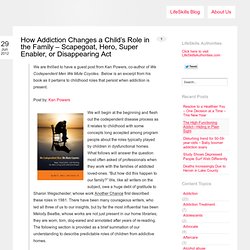
Below is an excerpt from his book as it pertains to childhood roles that persist when addiction is present. Post by: Ken Powers We will begin at the beginning and flesh out the codependent disease process as it relates to childhood with some concepts long accepted among program people about the roles typically played by children in dysfunctional homes.
What follows will answer the question most often asked of professionals when they work with the families of addicted loved-ones. “But how did this happen to our family?” The Class/Family Clown draws attention away from the pain and dysfunction at home by entertaining others. “To diffuse the battles that often raged around us, or to divert our parents from their attacks on one another or other members of the family, some of us learned to entertain. The Super Enabler is the child often closest to the addict emotionally. Emotional Health. Shah. Www.rcpsych.ac.uk/pdf/IPv7n2.pdf. Www.rcpsych.ac.uk/PDF/RaisingtheStandardOAPwebsite.pdf. Www.rcpsych.ac.uk/pdf/oldagenewssummer 2011.pdf. Www.rcpsych.ac.uk/files/pdfversion/CR158.pdf. Www.justice.gov.uk/downloads/protecting-the-vulnerable/mca/opg-603-0409.pdf.
Suicide in the elderly. Howard Cattell + Author Affiliations Despite the fact that suicide and its prevention continues to be a priority area for health care in the UK, suicide in the elderly remains a neglected subject receiving little interest and research attention.
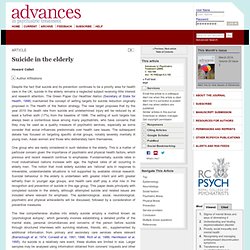
The Green Paper Our Healthier Nation (Secretary of State for Health, 1998) maintained the concept of setting targets for suicide reduction originally proposed in The Health of the Nation strategy. The new target proposes that by the year 2010 the death rate from suicide and undetermined injury will be reduced by at least a further sixth (17%) from the baseline of 1996. The setting of such targets has always been a contentious issue among many psychiatrists, who have concerns that they may be used as a quality measure of psychiatric services, especially as some consider that social influences predominate over health care issues. Suicide on the rise among older men. The number of suicides and the prevalence of suicidal tendencies is rising faster among older men than in any other age group, according to research released in the week the government postponed its suicide prevention strategy.

Data from the Office for National Statistics shows that the number of suicides among men aged over 55 has risen by 12% over the past decade, while suicides by men aged under 34 dropped by 30%. The mental health charity Calm said men aged 45 to 54 were still most likely to seriously consider taking their own life. Charities and mental health experts are concerned that across all age ranges there are far more male than female suicides.
Jane Powell, the chief executive of Calm, speculated that the recession may be having more of an impact on older men. "If you are middle-aged just now and your job and life prospects are diminishing then this is tough," she said. Credit: Guardian Graphics Powell said there were two reasons for the imbalance. Www.justice.gov.uk/downloads/protecting-the-vulnerable/mca/mca-code-practice-0509.pdf. Cognitive/ Learning Styles. Cognitive styles and learning styles refer to the preferred way an individual processes information or the different ways in which children and adults think and learn.
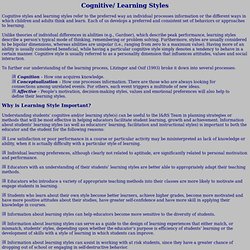
Each of us develops a preferred and consistent set of behaviors or approaches to learning. Unlike theories of individual differences in abilities (e.g., Gardner), which describe peak performance, learning styles describe a person’s typical mode of thinking, remembering or problem solving. Furthermore, styles are usually considered to be bipolar dimensions, whereas abilities are unipolar (i.e., ranging from zero to a maximum value). Having more of an ability is usually considered beneficial, while having a particular cognitive style simply denotes a tendency to behave in a certain manner. Cognitive style is usually referred to as a personality dimension that influences attitudes, values and social interaction. Cdn.basw.co.uk/upload/basw_32019-8.pdf. Dysfunctional family. Assessment | Biopsychology | Comparative | Cognitive | Developmental | Language | Individual differences | Personality | Philosophy | Social |Methods | Statistics | Clinical | Educational | Industrial | Professional items | World psychology | Clinical:Approaches · Group therapy · Techniques · Types of problem · Areas of specialism · Taxonomies · Therapeutic issues · Modes of delivery · Model translation project · Personal experiences · This article is in need of attention from a psychologist/academic expert on the subject.Please help recruit one, or improve this page yourself if you are qualified.This banner appears on articles that are weak and whose contents should be approached with academic caution A dysfunctional family is a family in which conflict, misbehavior and even abuse on the part of individual members of the family occur continually, leading other members to accommodate such actions.
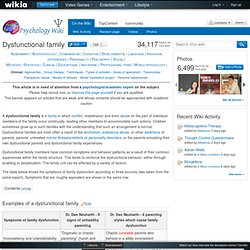
Examples of a dysfunctional family Edit. Aspects of Dysfunctional Families. Dysfunctional Families: Recognizing and Overcoming Their Effects "As a kid I was like a miniature adult.

I cooked and cleaned and made sure my little brothers got off to school. My Mom was always depressed and stayed in bed -- she was in the hospital a lot. I guess I never really was a kid. Now, I work hard to get As, take on lots of responsibility, put on this competent front. Mental models in human thinking and reasoning. Cognitive Biases. Psychology. Learning & Memory. Mental Models.
National Mental Health Development Unit. Mental Capacity Act 2005. Mental Health Act 2007. Mental Capacity Act. The Mental Capacity Act provides a framework to empower and protect people who may lack capacity to make some decisions for themselves.
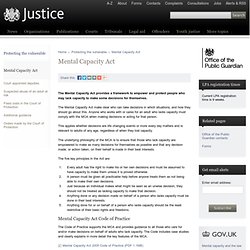
The Mental Capacity Act make clear who can take decisions in which situations, and how they should go about this. Anyone who works with or cares for an adult who lacks capacity must comply with the MCA when making decisions or acting for that person. This applies whether decisions are life changing events or more every day matters and is relevant to adults of any age, regardless of when they lost capacity. The underlying philosophy of the MCA is to ensure that those who lack capacity are empowered to make as many decisions for themselves as possible and that any decision made, or action taken, on their behalf is made in their best interests. The five key principles in the Act are: Every adult has the right to make his or her own decisions and must be assumed to have capacity to make them unless it is proved otherwise.
Www.cqc.org.uk/sites/default/files/media/documents/cqc_mha_report_2011_main_final.pdf. Top 10 Common Faults In Human Thought. Humans The human mind is a wonderful thing.
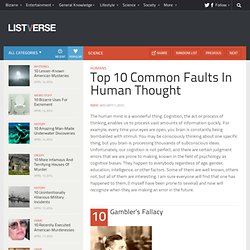
Cognition, the act or process of thinking, enables us to process vast amounts of information quickly. For example, every time your eyes are open, you brain is constantly being bombarded with stimuli. You may be consciously thinking about one specific thing, but you brain is processing thousands of subconscious ideas. Unfortunately, our cognition is not perfect, and there are certain judgment errors that we are prone to making, known in the field of psychology as cognitive biases. The Gambler’s fallacy is the tendency to think that future probabilities are altered by past events, when in reality, they are not. Official License holders for MHFA in England. Mental Health & Recovery - Centre for Mental Health.